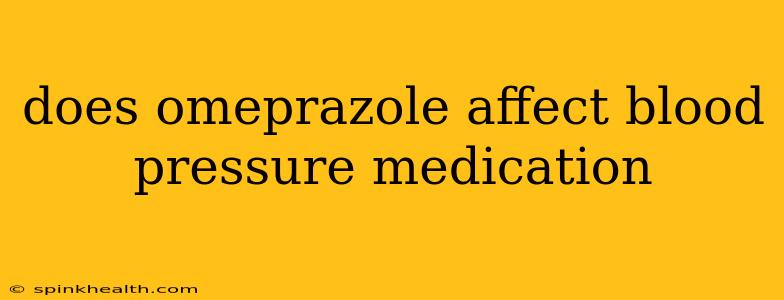Does Omeprazole Affect Blood Pressure Medication? A Deep Dive into Potential Interactions
Omeprazole, a widely used proton pump inhibitor (PPI) for heartburn and acid reflux, sometimes sparks concern among patients taking blood pressure medication. The question, "Does omeprazole affect blood pressure medication?", is a valid one, and understanding the answer can be crucial for managing your health effectively. This isn't about fear-mongering; it's about informed decision-making. Let's unravel this together.
The short answer is: it's complicated, and it depends. Omeprazole itself doesn't directly raise or lower blood pressure. However, the interaction is more nuanced than a simple yes or no. It's about how it affects the body's overall balance and the absorption of other medications.
Let's delve into the specifics:
How Omeprazole Works and its Potential Impact
Omeprazole works by reducing stomach acid production. While this is fantastic for soothing heartburn, it can potentially interfere with the absorption of some medications that rely on a slightly acidic environment to be fully absorbed into the bloodstream. This is where the link to blood pressure medication comes in.
Some blood pressure medications, particularly those that are acid-labile (meaning they break down in alkaline environments), might be less effectively absorbed if your stomach acid levels are significantly reduced by omeprazole. This doesn't mean you'll suddenly experience a drastic drop or spike in blood pressure, but it could subtly affect how well your blood pressure medication works.
Which Blood Pressure Medications are Most Affected?
While the research isn't definitive on specific drugs, some blood pressure medications might be more sensitive to changes in stomach pH than others. It's crucial to always consult your doctor or pharmacist if you are taking both omeprazole and blood pressure medication. They can assess your individual risk and recommend appropriate management.
Does Omeprazole Increase or Decrease Blood Pressure?
Omeprazole itself doesn't directly impact blood pressure. The concern arises from its potential interaction with other medications, not an inherent effect on the cardiovascular system.
What are the Symptoms to Watch Out For?
The impact of this interaction is usually subtle and may not manifest as noticeable symptoms. However, if you experience any significant changes in your blood pressure, like dizziness, lightheadedness, headaches, or palpitations, it's crucial to contact your doctor immediately. These are not necessarily symptoms of an omeprazole-blood pressure medication interaction, but warrant medical attention to rule out any underlying issues.
Can I Still Take Omeprazole and Blood Pressure Medication Together?
Absolutely! Millions of people take both medications without any problems. The key is open communication with your healthcare provider. They can monitor your blood pressure, adjust your medication dosages if needed, and address any concerns you may have.
What Alternatives to Omeprazole Exist?
If you're concerned about interactions, there are alternative medications for heartburn and acid reflux, such as H2 blockers (like famotidine or cimetidine) or other PPIs. Your doctor can help you determine the most appropriate option based on your individual health needs and any potential drug interactions.
When Should I Talk to My Doctor?
Discuss your medication regimen with your doctor or pharmacist if you're:
- Starting omeprazole while already taking blood pressure medication.
- Experiencing any unusual symptoms after starting or changing either medication.
- Concerned about potential interactions between your medications.
Your doctor is the best resource for determining the safest and most effective treatment plan for you. This information is for educational purposes and does not constitute medical advice. Always consult with a qualified healthcare professional before making any decisions related to your health or medication.

